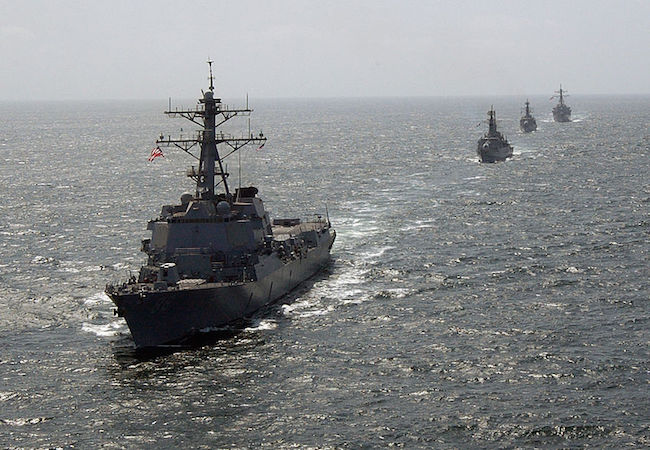
By Sadia Kazmi
The sea routes have always been a major source of global economic activity conjoined with the political interests of the states. They have remained integral in the quest for power and also play an essential role in maintaining the power equilibrium among the contending states. This is why the countries which are landlocked are considered to be less fortunate and handicapped in terms of pursuing their economic and political interests as compared to the littoral ones. However in order to fully utilize the maritime advantages, it is essential that an effective policy focusing on the security and safety of the sea lanes and water bodies; including both the domestic and international waters is devised and streamlined on the regular basis.
Gwadar port promises to offer huge dividends not just to Pakistan and China but has the potential to bring about benefits beyond the immediate region. Hence the maritime security is an important yet less attended area that demands serious attention by the policy makers. It is a fact that any deliberation on CPEC must evaluate and highlight the region’s prevailing and emerging maritime challenges. While the deep sea Gwadar port is going to place China and Pakistan in an extremely advantageous strategic position, it will also bring about a trend of intense competition among the contending states. India for instance considers itself the biggest stakeholder in China’s One Belt One Road initiative. Its ambitions to turn the Indian Ocean into India’s Ocean are perceived to be under great threat by Pak-China strategic cooperation in the form of CPEC.
Not only will China be able to station its vessels at the Gwadar port, securing permanent place for itself in the Arabian Sea but will also undermine the much desired Indian hegemony in the Indian Ocean while at the same time strengthening security for Pakistan’s seaward shores. The US also feels apprehensive of China’s alleged designs regarding diverting India’s attention from Asia Pacific, ultimately neutralizing US’ attempts to isolate/contain China. Hence the three major states India, US and China are very closely scrutinizing and re-evaluating their options around the Indian Ocean. Furthermore the Chahbahar port in Iran, not only provides a channel to India for an easy access into Afghanistan but also points to the increasing presence of India in Iran and Afghanistan. While the Eastern border of Pakistan is constantly troubled owing to the hostile neighbor, the Western borders will also come under direct security threats emanating from Indian supported and financed activities in Iran and Afghanistan. Hence Pakistan needs to keep the competing interests of the state in mind and formulate implementable policies to address these emerging challenges.
However recently Iran itself has expressed interest in joining the CPEC, which brings in hope that the expected “port competition” between Iran and Pakistan might not be initiated after all. Also the arrival and docking process of Chinese ship has already become a reality with the 1st Chinese cargo ship Zhen Xing Sung reaching the port in mid October. Hence it becomes all the more important to take preemptive measures to ensure fool proof security of Gwadar port. Some of the other challenges to the seaward activities include piracy, human trafficking, smuggling etc. Even though Pakistan does have the capability to safeguard CPEC, it requires more focused research, evaluation and dedicated finances to formulate more robust and up-to-date seaward security policies. Pakistan Navy is diligently rendering its services to ensure the security at three basic levels: the port security, vessel security and the security of the sea lanes.
More than 400 marines of Pakistan Navy’s Third Marine Battalion (TMB) are providing security to the Gwadar port round the clock. In August the launching ceremony of second maritime patrol ship BASOL was held at Liuzhou city, China. The presence of maritime security cooperation points to the fact that both the states are working towards drafting a comprehensive mechanism to ensure security of Gwadar and surrounding area. This enhanced security cooperation between two countries will auger well for the entire maritime region of interest. Another important development in this regard is that the Ministry of Defence Production under PSDP programme signed a contract with M/s CSTC of China for construction of 4 x 600 Tons and 2 x 1500 Tons Maritime Patrol Ships in June 2015. As per the contract, four ships are being constructed in China while remaining three ships are being constructed at Karachi Shipyard and Engineering Works. Also only last month in September the inaugural ceremony of the Fast Attack Craft 3 of Pakistan Navy was held. This again is the product of Pak-China cooperation which confirms that the navies of both Pakistan and China are fully committed to providing a safe and secure maritime environment pivotal to the success of CPEC. Indeed Pakistan-China collaboration has the potential to face the challenges and further enhance cooperation for indigenous ship construction industry.
However despite having satisfactory measures in place, one cannot afford to go lax regarding the continually emerging challenges to the maritime security from traditional and nontraditional threats. At the moment Pakistan is in the process of developing its maritime doctrine. This sure is the much needed right move in the right direction, which is aimed at developing coherence among Pakistan’s Navy, Air Force and Army. Along with that Pakistan should also enhance its efforts to acquire assured second strike capability. Only after giving considerable consideration to the maritime sector, will the CPEC be able to translate into something implementable.




